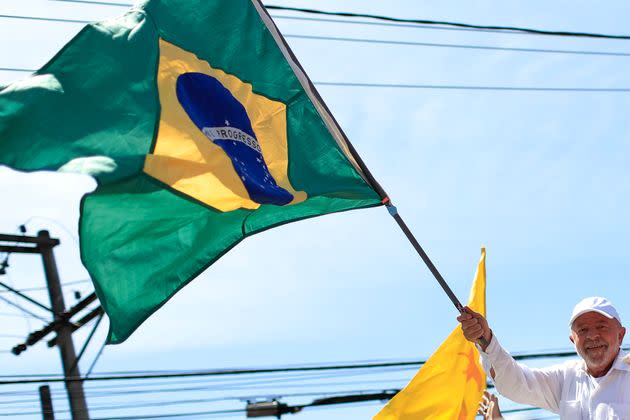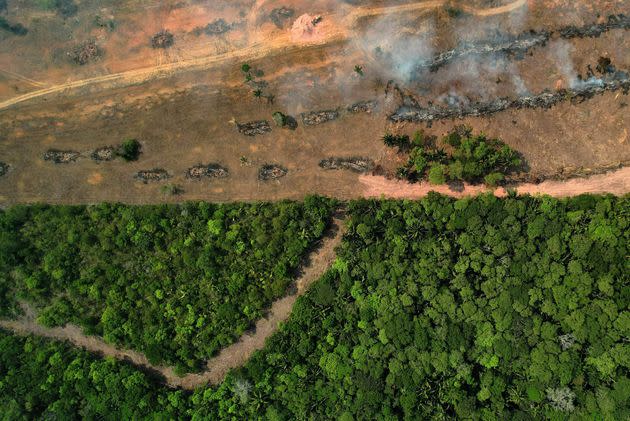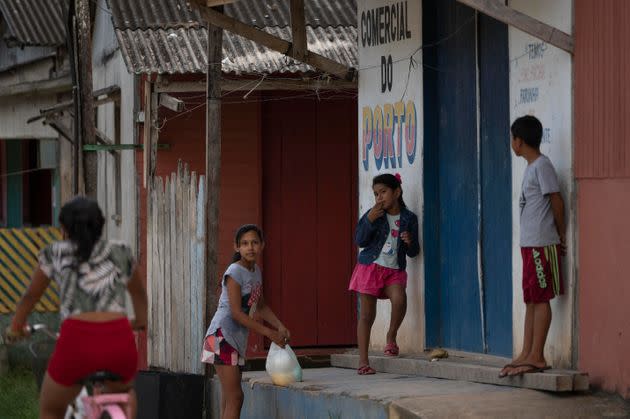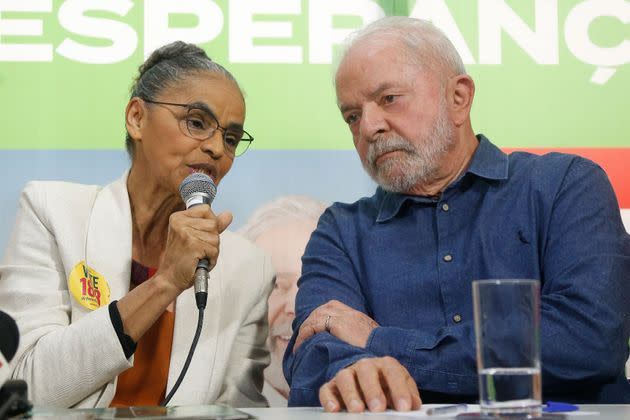‘It’s F**king Over!’ Lula da Silva’s Victory In Brazil Injects Hope Into Global Climate Fight

Brazil's president-elect, Luiz Inácio Lula da Silva, waves a Brazilian flag during a rally on Oct. 20, 2022, in São Gonçalo, Brazil. (Photo: Buda Mendes via Getty Images)
SÃO PAULO ― Luiz Inácio Lula da Silva’s victory in Brazil’s presidential election last Sunday has energized world leaders, climate activists and environmentalists ahead of this year’s United Nations climate change summit, which kicks off Sunday in Egypt.
In an election many saw as crucial to the future of the Amazon rainforest and staving off catastrophic planetary warming, the leftist da Silva, known affectionately as “Lula,” narrowly ousted far-right President Jair Bolsonaro, a staunch climate change denier who has presided over skyrocketing deforestation in the Amazon rainforest that turned him into a global pariah.
Da Silva, who oversaw drastic reductions in deforestation rates and carbon emissions during his presidency from 2003 to 2010, seized on climate issues during the race to paint Bolsonaro as a global outlier who had isolated Brazil on the world stage. In his first speech as president-elect, he pledged to “fight for zero deforestation” and combat the illegal logging, mining and ranching that has ballooned under Bolsonaro’s watch.
“Brazil and the planet need the Amazon alive,” da Silva, who will travel to Egypt next week as an early sign of his intention to reassume a leading role in the climate fight, said Sunday night. “We will prove once again that it is possible to generate wealth without destroying the environment.”
Brazil controls the vast majority of the Amazon rainforest and is also home to other sensitive environmental regions that scientists see as crucial to the global battle against climate change. There and abroad, climate advocates did not mince words when the election results were clear.
“It’s fucking over!” the Brazilian Climate Observatory, a São Paulo-based think tank, said in a release Sunday night. “The nightmare is due to end at last.”
Christian Poirier, program director at the environmental nonprofit Amazon Watch, told HuffPost that a Bolsonaro victory “would have meant the end of the Amazon.” Indeed, scientists have sounded the alarm that the rainforest is nearing a tipping point beyond which it will be unable to recover.
“Lula winning it, particularly on a platform of environmental preservation and respect for human rights, particularly the rights of forest peoples and Indigenous peoples, was a great victory in the face of the extreme threat posed by another four years of Bolsonaro — the existential threat,” Poirier said. “Given the importance of the Amazon, the importance of this biome to world climate stability, this was the most consequential election on the planet.”

An aerial view of a burnt area in the Amazon rainforest near Porto Velho in the Brazilian state of Rondonia on Aug. 31, 2022. Experts say Amazon fires are caused mainly by illegal farmers, ranchers and speculators clearing land and torching trees. (Photo: DOUGLAS MAGNO via Getty Images)
The environment does not typically play a leading role — or any role at all — in Brazilian elections. But during this campaign, da Silva outlined an ambitious set of proposals that allies have likened to a Brazilian version of the Green New Deal that progressives in the United States pushed. He also promised to restore protections for Indigenous tribes that accused Bolsonaro of “genocide” and crimes against humanity, pledging to create a new Indigenous affairs ministry and to appoint a tribal leader to helm it.
The road ahead, however, will not be easy. Deforestation rates continued to climb in the months before the election, surging 81% over last year’s total in August and another 48% in September. They are likely to keep rising at least through the first year of da Silva’s presidency, and the forest’s recovery over the next four years is far from guaranteed.
“Truly, what we’re seeing in the Amazon is a Wild West scenario,” Poirier said. “This scenario is not going to change overnight.”
An Ambitious Agenda Faces Massive Challenges
The Amazon is only one of the major environmental regions that faced rampant destruction under Bolsonaro, but it is indicative of the broader challenges that will face da Silva as he attempts to rebuild Brazil’s global image and reassemble a government capable of making Brazil a leader of the international climate fight again.
Bolsonaro spent four years gutting Brazil’s once-robust environmental regulatory regime and the government agencies that implemented it. Constraints on federal spending will make it difficult to fully reconstruct environmental ministries, while a conservative Congress and a crowded list of priorities could easily prevent any major climate proposals from advancing.
In the Amazon boomtowns where illegal miners and loggers sought their fortunes with Bolsonaro’s blessings, federal officers tasked with overseeing conservation and Indigenous rights struggled to even keep vehicles in working order. Bolsonaro’s lack of enforcement created backlogs of unpaid fines and fostered a culture of impunity toward environmental destruction.
Organized crime networks that thrived under Bolsonaro and drove much of the environmental devastation that occurred on his watch are now far larger and more sophisticated, technologically savvy and financially robust than they were during da Silva’s prior two terms in office.
“The most difficult thing is going to be the crime in the Amazon,” said Marcio Astrini, the executive secretary of the Climate Observatory. “Crime in the Amazon is today more powerful, and has more political influence and money, than ever.”
In parts of the Amazon, rebuilding a government capable of enforcing environmental protections and combating criminal activity will be enough, Astrini said. But in large swaths of the region, a lack of formal economic opportunities has made entire communities dependent on criminal networks, meaning da Silva and his government will have to help create jobs, provide investments into businesses and build local economies capable of breaking that dependence.

Children gather outside in Manicore, a city located on the banks of the Madeira and Manicore rivers in the Amazon rainforest in Brazil's Amazonas State, on June 6, 2022. (Photo: MAURO PIMENTEL via Getty Images)
Despite the challenges, da Silva and his team are confident that they can repeat the success of his first presidency, when deforestation rates plunged 70%. That, in turn, will help reverse a troubling rise in overall emissions, which increased 9.5% in 2020, a year in which the pandemic led emissions to fall globally. That has taken Brazil far off-pace to meet the targets laid out in the Paris Climate Agreement.
“Deforestation is responsible for 70% of our emissions. If we reduce deforestation, we reduce emissions,” Marina Silva, who served as environment minister during da Silva’s presidency and is among the contenders to assume the role next year, told reporters in São Paulo days before the election.
But da Silva’s “ambitions are bigger” than merely meeting the Paris goals, she said.
During Bolsonaro’s presidency, Brazilian environmental groups forged international partnerships in an effort to promote green policies and protect the forest at the state and local levels, with some success. Prominent members of the Brazilian left, meanwhile, made connections with progressives in the United States and Europe in an effort to craft an environmental response ready-made for da Silva to adopt and implement.
Three months after Bolsonaro’s inauguration in 2019, Alessandro Molon, the Socialist Party opposition leader in the lower house of Brazil’s national legislature, told HuffPost in an interview at his office in Brasília that he took inspiration from the Green New Deal framework U.S. lawmakers like Sen. Bernie Sanders (I-Vt.) and Rep. Alexandria Ocasio-Cortez (D-N.Y.) advocated at the time. The three-word moniker was used to describe a host of progressive ideas for dealing with climate change and signaled a shift in mainstream political thinking on how to curb planet-heating emissions away from carbon pricing and toward industrial policy, where the government sets economic priorities by pumping subsidies into sectors like clean energy.
The following year, Jaques Wagner, a Brazilian senator from da Silva’s party and a former defense minister, appeared on a panel in New York City alongside the academic Daniel Aldana Cohen and writer Naomi Klein, two of North America’s most influential eco-socialist authors.
Wagner touted Brazil’s “great potential in what we’d call the bio economy,” meaning diesel fuel refined from plants and more ecologically efficient crops. In keeping with the economically populist spirit that animated early calls for a Green New Deal, he said the only way to gain support for slashing emissions would be “structural solutions” that “build an economy that works for everybody.”
It is absolutely crucial that we see climate change as not only the biggest challenge but also as an opportunity to [generate] solutions for our development.Izabella Teixeira, former Brazilian minister of the environment
Molon unveiled Brazil’s version of the Green New Deal at COP26 in Glasgow, Scotland, last year. In June, he presented the plan directly to da Silva and his environmental team, which reportedly agreed with the basic concept.
Da Silva later released a slate of proposals that drew on similar ideas: As Reuters reported, his plans called for stronger federal protections of large swaths of the Amazon and new investments meant to promote a greener Brazilian economy.
The last time da Silva served as president, environmentalists criticized him for prioritizing the economy over the Amazon and Indigenous rights. It was his government that authorized the construction of the Belo Monte Dam, a controversial hydroelectric project in the Amazon region, despite fierce pushback from human rights advocates and tribes.
Yet during da Silva’s last administration, Brazil distinguished itself from other emerging economies as the only major nation to reduce deforestation while maintaining record economic growth. In the years since, the influx of scorched acreage and uptick in global temperatures has made striking that balance again more difficult, but da Silva’s allies have stressed that his climate aims are part of a broader economic agenda — an argument they will likely deploy in an effort to win over both Brazil’s Congress and the public.
“This is a development agenda: Climate is part of the equation of development solutions in Brazil,” said Izabella Teixeira, who served as minister of the environment under da Silva and his successor, Dilma Rousseff. “It is absolutely crucial that we see climate change as not only the biggest challenge but also as an opportunity to [generate] solutions for our development.”

Brazilian environmentalist Marina Silva, left, speaks next to president-elect Luiz Inácio Lula da Silva during a press conference in São Paulo on Sept. 12, 2022. (Photo: MIGUEL SCHINCARIOL via Getty Images)
That view, she said, can help Brazil “connect the dots” between climate and other major da Silva priorities, including his plans to bolster the Brazilian economy, combat poverty and reduce rates of extreme hunger, a problem that re-emerged during the pandemic and now tops da Silva’s list of concerns.
“[Hunger] is a good example of how we can improve climate performance,” she said. “We are one of the most important food producers in the world, and we should come up with solutions to provide for international society. It’s not only a huge opportunity for Brazil to develop innovative equations to solve development problems and social inequalities, but also to share our technology and solutions with other countries, mainly in the Global South.”
With The World’s Eyes On Brazil, A New Brazil Looks Back
Given the constraints da Silva will face at home, the sort of international help that dried up under Bolsonaro will likely play a crucial role in helping him deliver on his promises. And after four years of Bolsonaro, the world’s major powers seem more than happy to welcome Brazil back to the climate fight.
On Thursday, Brazil’s Supreme Court ordered the resumption of the Amazon Fund, an international financing mechanism for forest protection projects, in January, four years after Bolsonaro shut down its most powerful programs. Norway and Germany, which froze payments to the fund in response to Bolsonaro’s policies and a record outbreak of fires in 2019, have said they are open to resuming payments under da Silva.
Truly, what we’re seeing in the Amazon is a Wild West scenario. This scenario is not going to change overnight.Christian Poirier, program director at environmental nonprofit Amazon Watch
The European Union has signaled its optimism about the completion of a trade deal with Mercosur — a bloc of South American nations that includes Brazil — that was on hold largely due to French President Emmanuel Macron’s opposition to Bolsonaro’s environmental policies. And U.S. President Joe Biden, who discussed climate with da Silva during a congratulatory phone call this week, may still be open to crafting an international financial aid package to help protect the forest.
But da Silva’s trip to Egypt this week is not merely meant to bolster international support for his agenda. Brazil once held a unique role in the global climate fight: It was perhaps the only Global South nation that had the power, influence and a large enough share of vital resources to elbow its way into a leadership position among the world’s largest countries.
Under da Silva and his leftist successor, Rousseff, Brazil typically used that position to push wealthy nations to provide broader assistance to low- and middle-income countries on the front lines of the climate crisis.
Now da Silva wants to reclaim that position four years after Bolsonaro abandoned it. Silva, the former minister of the environment, told reporters last week that Brazil will push to provide more financial aid not just to developing nations but to civil society groups and Indigenous populations that are confronting climate change head-on. Last year’s summit promised more money to Indigenous tribes, whose knowledge and adaptive efforts have taken on an increasing role in the climate fight. But Silva wants to push for even more.
Brazil will also renew its efforts to partner with other tropical nations — particularly Indonesia and those in Africa’s Congo Basin — that are home to most of the planet’s rainforests, Celso Amorim, a former foreign minister under da Silva, told reporters. Brazil will also work closely with other nations in the Amazon basin to reduce deforestation in the Venezuelan, Peruvian and Bolivian regions of the forest, Amorim said.
Amorim, who may also earn a ministerial role in da Silva’s government, told Reuters in October that Brazil would seek to host an international summit on the Amazon, and said prior to the election that Brazil “will fight” to strengthen existing treaties meant to protect the forest.
Da Silva’s victory caps off something of a “green tide” in Latin America as left-wing leaders pledging to reset their countries’ relationships with nature have won elections in countries stretching from Chile to Colombia to Honduras. Ambitious new presidents have already found it difficult to implement their plans in those nations. But with the region’s largest and most important economy on board, there is at least hope that Brazil could help make South America a new power center in global negotiations over emissions.
“I am optimistic,” the Climate Observatory’s Astrini said. “It’s not just better than Bolsonaro. It’s a whole new situation. We’ve never in this country had a president talking about zero deforestation, climate and environmental protection like we’re seeing right now.”
This article originally appeared on HuffPost and has been updated.

 Yahoo News
Yahoo News 